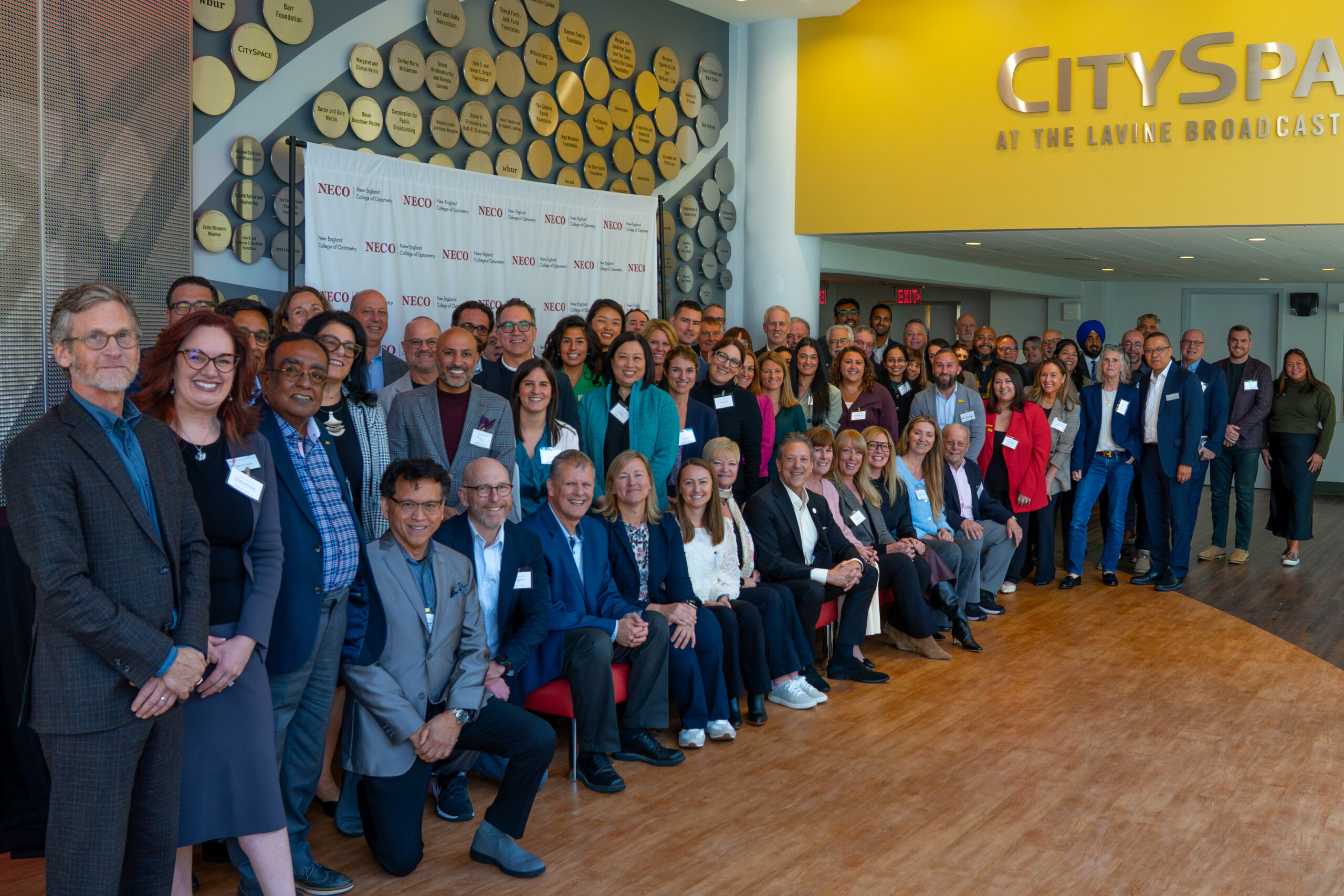
On November 3 & 4, 2025, NECO brought together more than 100 leaders from education, health care, and industry this week for its fifth annual Industry Collaborative—a two-day event examining how technology, innovation, and collaboration are reshaping the future of optometric education and patient care.
NECO launched the Collaborative on a simple premise: not all conflict is bad. Participants were encouraged to “share the air,” disagree respectfully, to listen fully, and to test assumptions within ground rules that balanced psychological safety with rigorous challenge.
Throughout the event, sessions explored the intersection of AI and clinical decision-making, the role of partnerships between academia and industry, and new models for integrating innovation into optometric curricula. Participants included educators, researchers, and corporate leaders from across the country, representing 48 organizations spanning academic institutions, associations, care-delivery organizations, media partners, and vision care companies.
This year’s Collaborative featured keynote presentations from Joseph Aoun, PhD, President of Northeastern University, and Joshua Baker, OD, President & CEO of Midwestern University, alongside panel discussions, tech demonstrations, and lively Q&A sessions.
“The Industry Collaborative is our opportunity to ‘open the hood’ and show what’s really happening inside optometric education,” said Howard Purcell, OD, FAAO, Dipl., President & CEO of NECO. “We’re facing rapid changes in technology and patient needs, and our responsibility is to ensure students are ready for both — not just as clinicians, but as innovators.”
The event kicked off on Monday at NECO’s Beacon Street campus with a dinner, followed by the College’s inaugural Student Innovation Award, which was sponsored by VSP on behalf of the Rick Bay Foundation. (See separate coverage in our News section.)

On Tuesday, attendees gathered at WBUR/CitySpace at 890 Commonwealth Avenue where the day began with a fireside chat between Dr. Joshua Baker and Dr. Purcell. In their wide-ranging discussion, Dr. Baker cautioned against assuming certainty in an era of technological disruption.

“The person who tells you they know how new technology will affect health care or education — that’s a ‘buyer beware’ moment,” he said. “None of us really knows. But if we stay nimble, we can make sure our students are prepared to excel no matter what tools or platforms come next. That’s the challenge.”
A lively Q&A session followed with the realization that partnering with other health professions (pharmacy, nursing, physical therapy) can only help optometry since the struggle of integrating new technology and augmenting curriculum is common to each profession.

After a short break, the morning’s first session focused on the foundation of optometric education and clinical readiness. Moderated by Erik Weissberg, OD, FAAO, Vice President and Dean of Academic Affairs at NECO, the panel spoke about the increased cognitive demands placed on students and the complex nature of the licensure process, particularly exams like Part I in applied basic science. The session examined how institutions can define what is vital to teach, how much mastery is needed during training, and how to support students in becoming resilient, future-ready clinicians—without losing sight of the foundational principles that define the profession. Panelists included Dr. Alicia Feis, Dean of the Arizona College of Optometry and current President of ASCO; Dr. Joshua Baker; Dr. Jennifer Reilly, Assistant Professor at NECO; and Dr. Jeffery Walline, Associate Dean at Ohio State University College of Optometry.

The second session, “Tech-Forward, Patient-Centered Innovation,” showcased emerging technologies that seek to reshape the way optometrists deliver care, manage workflow, and engage with patients. Moderated by Gary Chu, OD, MPH, FAAO, Vice President of Professional Affairs at NECO, panelists explored practical use cases, educational implications, and the importance of maintaining patient-centered care in an increasingly digital world. Panelists included Dr. Rupe Hansra, Vice President of Professional Affairs at Topcon; Dr. Timothy Bossie, Senior Director, Owned Clinics & Outreach Affiliations at NECO; and Dr. Melissa Trego, Dean of Academic Affairs at SUNY College of Optometry.
Following a networking lunch, the third session reviewed the influence of industry and new technology on optometric education and student success. The session highlighted how collaborative education initiatives are enhancing the way optometry is taught and learned, and included demonstrations of AI-powered study guides based on curated content, as well as a simulated patient interaction using SimConverse, a simulation platform that uses generative AI to play the role of a patient.

Panelists for this session included NECO staff and faculty, including: Dr. Thanasis Panorgias, Associate Professor of Vision Science & Director of Graduate Studies; Dr. Aurora Denial, Chair of the Department of Clinical Education & Clinical Science; Dr. Randall Case, Senior Director of Learning, Technology, and Innovation; and Emily Bouchard, Associate Director of Educational Technology & Assessment.
The closing keynote was delivered by Dr. Joseph Aoun, President of Northeastern University and autor of “Robot-Proof: Higher Education in the Age of Artificial Intelligence.” Dr. Aoun focused on the rise of AI and its implications not only for higher education but for society in general.

“We must understand both the disruption and the opportunity presented by AI,” he said. “Our task as educators is to cultivate what I call humanics — combining technical literacy with the human skills of empathy, creativity, and critical thinking. Nurturing these skills in our students is at the core of our role as educators.”
The Industry Collaborative closed with a roundtable moderated by Dr. Howard Purcell focused on “The Optometrist of the Future” and the role that the media can play in supporting education and technology initiatives at schools across the country. Panelists included Dr. Peg Achenbach of Optometry Times and Ophthalmology Times; Marc Ferrara, a consultant for Jobson Optical Group; Erinn Morgan, Chief Content Officer for Insight Media Group; and Jack Persico, Editorial Director for Review of Optometry.

